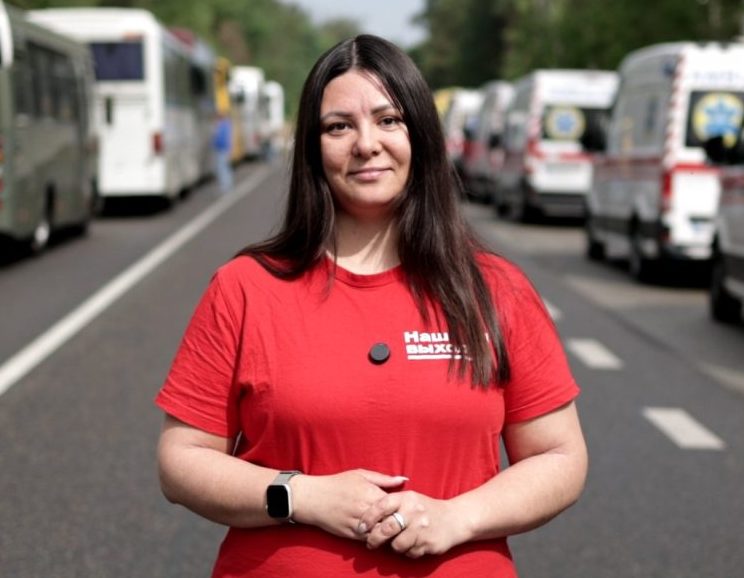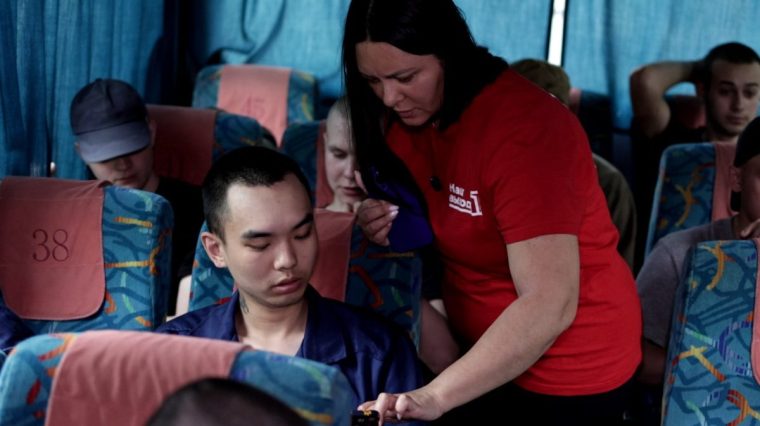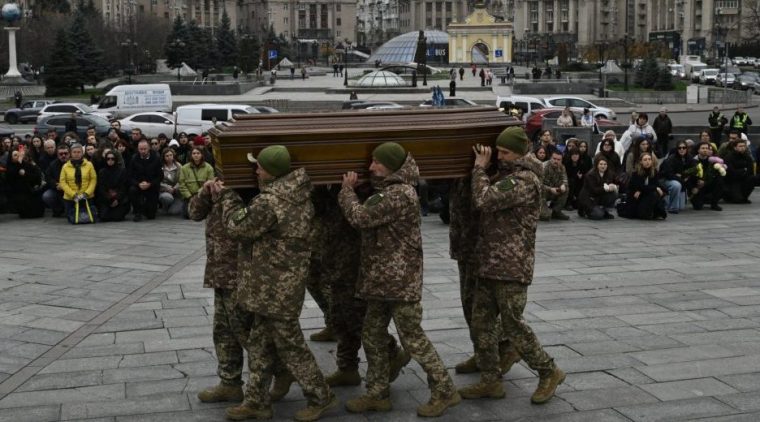KYIV – In the summer of 2023, 37-year-old Iryna Krynina was working as an accountant in Krasnoyarsk, a Russian city on the Yenisei River in Siberia.
She had no idea how drastically her life was about to change when her partner, Evgeny Kovtkov, was recruited into the Russian military and sent to invade Ukraine.
Within months of being mobilised, Kovtkov went missing. “It was so hard to get any information from the Russian government. I did not know where he was, or in what state,” Ms Krynina told The i Paper, during an interview at a park in central Kyiv.
Ms Krynina decided to find her partner herself. Speaking to his colleagues and other officials posted with him, she learned that Zhenya — as she fondly called him — had been captured by Ukraine.
With trepidation, Ms Krynina contacted the Ukrainian government through a helpline called “Khochu Zhit” (translated into “I want to live”), created to encourage Russian soldiers to desert their positions in Ukraine. “They confirmed to me that Zhenya was indeed with them. I was thrilled to find him alive,” she said.
Convinced that, like her, he wanted nothing to do with the invasion of Ukraine, she packed her bags and, with her two children, made the difficult journey to the “enemy state” in October 2023.
“I didn’t tell anyone, no relatives, no colleagues, it was a total secret. I was probably guided by love or something,” she said.

Ms Krynina said she was against Russia’s invasion of Ukraine “from the very first day”, back in 2014 when Vladimir Putin invaded Crimea. “This war is horrible and unjust. It has only brought grief and destruction, and Putin is the one who started this.”
She blamed the Russian president for the many casualties on both sides. “If it weren’t for him, hundreds of thousands of families wouldn’t have suffered, husbands wouldn’t have died, gone missing, or been captured,” she said.
Her plan was to negotiate her partner’s release on the condition that he would not return to the front lines or to Russia. She hoped they would migrate to a safer place with the kids.
But in Kyiv, she had a rude shock. “He was not happy to see me. He lowered his head and asked me ‘Why did you come here?’” she recalled.
Ms Krynina believes her partner had been brainwashed with Russian propaganda.
“He didn’t want to betray Russia. He wanted to go back through a prisoner swap, and leaving with me would cause him problems.”
She had burned all her bridges back home, leaving her job, taking her 12- and 13-year-old children out of school, and cutting contact with friends and workmates. “I left behind everything to come here, for my love, and I was abandoned. I fell into depression and couldn’t sleep at night,” she said.
Being in Russia had become unbearable, she said, so going back was never an option. “It was a horrible state to be in. It was hard to watch how everyone in my city and country pretended that nothing was happening,” she recalled. “And after Zhenya was taken to the war, I also saw the real attitude of the authorities towards the soldiers … they are just expendable material, nothing more than fuel for their war.”
With the little money she had, Ms Krynina rented an apartment in Kyiv.
She decided to use her new circumstances to help other Russian families find loved ones in Ukrainian prisons. Along with two other Russians — activist Olga Rakova and award-winning photographer Victoria Ivleva, who defected to Ukraine at the start of the invasion – Ms Krynina founded an organisation called “Nashi Vyhod” in December 2023, Russian for “Our way out”.
She and her team help families pass messages and even deliver parcels to captives in prison camps, in co-ordination with the Ukrainian government. “I know what these families are going through. In Russia, you don’t get any help when your loved one disappears; there’s absolute indifference,” she explained.
They also connect prisoners and their families with lawyers in Russia to help them pressure the Russian government to seek prisoner swaps and prevent any returnees from being recruited again.
In July 2025, her organisation was designated a “foreign agent” by the Russian government, a label often used to target dissent and opposition.

Ms Kyrnina still finds it unbelievable that, in six months, she went from being an accountant in Russia to an advocate for prisoners of war in Ukraine.
“When I went to save Zhenya, I could not have imagined that I would end up leading a movement helping thousands of families,” she said, adding that she does not see her work as helping Russia, but rather as supporting Ukraine in getting its people back.
Since its inception, Nashi Vyhod has worked with 8,000 families in Russia, with many cases resulting in a successful return of prisoners. “We have also managed to deliver over 500 parcels and nearly 400 photographs. Those are always very emotional moments,” she said.
One prisoner they helped earlier this year, Ms Krynina recalled, had been captured at the beginning of Russia’s 2022 invasion and had not seen or heard from his family in three years. “His wife was pregnant when he left, and he had never known his child, so when we came to the camp with a photo of his son, he broke down. It was an indescribable moment,” she said.
None of this would have been possible without the Ukrainian government, Ms Krynina says. Early last year, not long after her journey to Kyiv, the Ukrainian Co-ordination Headquarters for the Treatment of Prisoners of War launched a project called “Khochu Naiti” — meaning “I Want To Find” – in January 2024.
“This project is a humanitarian initiative to let Russian families know what happened with their loved ones,” Petro Yatsenko, a spokesperson for the co-ordination office, told The i Paper.
“We know that a lot of Russian families are misinformed or not informed at all about what happened with their sons, husbands who were mobilised and disappeared in Ukraine. They don’t have an organisation like ours to search for answers. So what we do here is establish a line of connection with them.”
Khochu Naiti is essentially a Telegram bot that allows Russian families to seek information in Ukrainian databases of prisoners of war, and Russians killed in Ukraine.
“Through the Telegram app, which is very widely used in Russia, they can share with us details about their family members, and the system will process it automatically, searching for that query against our database,” he explained.
Since its launch in January 2024, Khochu Naiti has received 144,138 requests from Russians searching for missing servicemen.

These figures provide a unique insight into the astounding scale of Russian losses, which Moscow refuses to acknowledge. Analysts have estimated that nearly 250,000 Russians have been killed or injured, and over 50,000 are missing as of October. Nearly 400,000 Ukrainian soldiers have been reportedly killed and injured since the start of the war, with over 70,000 soldiers and civilians reported missing as of September.
“Very often, Russian military officials don’t believe a soldier’s family if they share that their loved one is in Ukrainian captivity. They want proof, and that is what we try to give them to pressure their authorities,” Yatsenko said.
Ms Kyrnina’s team plays a vital role here, working with Ukrainian officials, and visiting detention centres where a Russian soldier may have been identified.
“We go to the prisoner camp, meet the captive, help their families speak to them over the phone, and even record videos, photos to help relatives in Russia gather evidence,” she explained.
The unlikely alliance helps families on both sides, but it is essential for the safety of Ukrainians in Russian captivity, mainly because the Russian government does not comply with its obligations under international conventions, and has been accused of torture, abuse and even murder of prisoners.
“Our soldiers and civilians in Russian prisons have no connection with the outside world, and the conditions are very bad. So we need to bring them back as soon as possible,” Yatsenko said.
Your next read
Ms Krynina’s partner was sent back to Russia in an exchange on 2 October. “I hope he will not be sent back to war, that he will be able to have the chance to rethink everything he has lived through and done,” she said.
Meanwhile, the now 39-year-old is building a new life with her children under the shadow of the Russian bombs. “Every time Kyiv is shelled, which is often, we go down to the bomb shelter,” she said.
While her NGO is supported by private donations, she continues to work online as an accountant to support her family.
She misses her home and often wonders if she will be able to return. “Sometimes I do miss [my city] … I want to visit my mother’s grave,” she said.
But Ms Krynina’s work has given her new purpose. Having witnessed the carnage inflicted by the war, she is determined to oppose the forces that caused it.
“I feel sorry for my country and for our people, who were forced by the authorities and Putin to go to an unjust and brutal war destroying other people’s cities, lives, and families,” she said.
“I only hope he will be held accountable for all the evil he has caused.
“Sure, it is challenging, and even surreal, especially with increasing drone attacks. I moved here for love, but I feel I am staying here for something more meaningful.”
